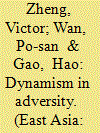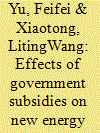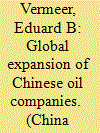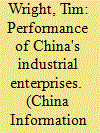|
|
|
Sort Order |
|
|
|
Items / Page
|
|
|
|
|
|
|
| Srl | Item |
| 1 |
ID:
159410


|
|
|
|
|
| Summary/Abstract |
The present article makes an attempt to empirically examine the linkage between
board composition and financial performance of the listed Indian and Chinse
firms spanning over the period from 2010 to 2014. Board composition comprises
of the four variables, namely, board size, auditors’ quality, CEO duality
and proportion of independent directors on the board. The study finds that for
Indian firms, the separation between the chief executive officer (CEO) and the
chairperson does have positive impact on the firms’ return on equity (ROE),
while for the Chinese firms, the proportion of independent directors on the
board does significantly influence ROE of the firms. Firms with higher proportion
of independent directors on their boards experience greater ROE. However,
auditors’ quality and board size are not found to have any impact on the ROE of
the firms of either country.
|
|
|
|
|
|
|
|
|
|
|
|
|
|
|
|
| 2 |
ID:
092813


|
|
|
|
|
| Publication |
2009.
|
| Summary/Abstract |
This study investigates the causality from environmental investment (as a long-term effort) and expenditure (as a short-term effort) to financial performance in the US electric utility industry. The industry is one of the large air polluters in the United States. This empirical study finds that the environmental expenditure under the US Clean Air Act has had a negative impact from 1989 to 2001. The negative impact has become much effective after the implementation of the Title IV Program (1995) of the US Clean Air Act. This study cannot find the influence of environmental investment on financial performance by a statistical test although it indicates a positive impact. In the United States, fossil-fueled power plants such as coal-fired ones still produce a large portion of electricity. The generation structure is inconsistent with the betterment in the US environmental protection and imposes a financial burden to electric utility firms.
|
|
|
|
|
|
|
|
|
|
|
|
|
|
|
|
| 3 |
ID:
178838


|
|
|
|
|
| Summary/Abstract |
This paper aims to provide new evidence on the relationship between green investment and firm performance through micro-level data. Data of energy listed firms in China from 2008 to 2017 are used here to explore this relationship. The research results show that green investment has a significant and positive correlation with financial performance, that is, increasing green investment helps improve financial performance. In the third year after investment in energy conservation and emission reduction, financial performance has been significantly improved. Additionally, environmental tax, government subsidies, and technological innovation have different positive moderating effects on green investment in promoting financial performance, and this result is more obvious in the long-term performance. Lastly, this paper finds that green investment helps reduce environmental violations and promote environmental performance, and environmental performance can strengthen the impact of green investment in improving the long-term performance of firms. This conclusion implies that firms should take environmental investment as its long-term strategy.
|
|
|
|
|
|
|
|
|
|
|
|
|
|
|
|
| 4 |
ID:
163321


|
|
|
|
|
| Summary/Abstract |
This paper addresses the long debate over the superiority of the performance of family- vs non-family-controlled companies from the contesting perspectives of entrepreneurial familism and managerial capitalism. Publicly listed family- and non-family-controlled companies in Hong Kong have been selected for a comparison of their overall performance. The focus is on Hang Seng Index constituent companies in general, and on two cases in particular: one non-family-controlled bank (HSBC), and one family-controlled bank (BEA). We found that family-controlled companies were not necessarily less competitive than non-family-controlled companies. Specifically, when HSBC and BEA were compared, the latter showed no clear inferiority in operating profit margin and return on assets, even though the former enjoys unparalleled advantages, such as an overwhelming superiority in size, the privilege of issuing notes, and status as Hong Kong’s quasi-central bank. Therefore, we argue that entrepreneurial familism seems to be a resilient source of business dynamism, particularly when family-controlled companies have been repeatedly tested by adverse socioeconomic crises. Based on the finding, it is suggested that governments across the world should provide a favorable institutional set-up to facilitate the development of family businesses.
|
|
|
|
|
|
|
|
|
|
|
|
|
|
|
|
| 5 |
ID:
181393


|
|
|
|
|
| Summary/Abstract |
There has been a debate on how the state-driven anticorruption movement during the Xi Jinping administration has influenced state-owned enterprises (SOEs). Research has examined the relationship between corruption and economic development at the country level in Asia and has found paradoxically that economic growth and high corruption levels can coexist. However, the “Asian paradox” that appears at the country level may be a transitional phenomenon of the short term. Not many researchers have empirically compared individual firm-level performance before and after a strong anticorruption drive, drawing on relevant comparison groups. This study tests whether Xi’s 2012 anticorruption campaign improved SOEs’ performance. With a difference-in-differences method, it explores whether the anticorruption campaign had different effects on the financial performance of SOEs and non-SOEs (private companies). We find that the anticorruption initiative improved SOEs’ financial performance and benefited SOEs more than non-SOEs.
|
|
|
|
|
|
|
|
|
|
|
|
|
|
|
|
| 6 |
ID:
175037


|
|
|
|
|
| Summary/Abstract |
In this study, subsidies are classified into government subsidies beforehand (GSB) and government subsidies afterwards (GSA). We examine the impacts of GSB and GSA on the financial performance of Chinese enterprises of New Energy Vehicle (NEV). Analyzing a dataset of Chinese NEV firms' financial performance from 2013 to 2017 with panel regression models, we demonstrate that the two forms of government subsidies have different impacts on New Energy Vehicle enterprises' performance. Specifically, we find a positive U-shaped relationship between GSB and financial performance and an inverted one between GSA and financial performance. We further investigate the moderating role of intelligent transformation in the relationships between government subsidies and NEV enterprises’ performance. Our empirical analysis suggests that intelligent transformation can improve the efficiency of GSA and weaken the negative effects of excessive GSA. These results highlight the importance of intelligent transformation for NEV enterprises, providing policy makers with new insights into NEV subsidy policies.
|
|
|
|
|
|
|
|
|
|
|
|
|
|
|
|
| 7 |
ID:
137540


|
|
|
|
|
| Summary/Abstract |
PetroChina, Sinopec, and China National Offshore Oil Corporation (CNOOC) have been prominent instruments used by the Chinese government in its policies to ensure greater security of oil and gas supply in the face of growing domestic shortages. Chinese overseas acquisitions and activities have diversified, with a greater emphasis on offshore, gas and the Americas. Both parent and listed daughter companies are run by CCP-appointed managers who have to balance political and commercial goals. Their lacklustre financial performance can be attributed to domestic and institutional constraints, such as state-set social goals, low pricing, and government controls over their monopolies. Not only have state companies sustained losses from refining activities, but financing their rapid expansion has also increased their debts and dependency on the government. Cases of corruption have further weakened their political influence. Long-term supply contracts have made a greater contribution to the security of energy supply as compared with equity oil and gas. Nationalistic preferences for investment over trade increase company risks but are somewhat mitigated by an integral economic package approach and political backing in weak countries. Recent policies to reduce monopoly power are unlikely to produce viable commercial alternatives, but may increase the focus on listed daughter companies, overseas assets and international trading. Because of these developments and the recent fall in oil prices, a better evaluation of political and economic risks is required.
|
|
|
|
|
|
|
|
|
|
|
|
|
|
|
|
| 8 |
ID:
137534


|
|
|
|
|
| Summary/Abstract |
This paper investigates the impacts of ISO 14001 adoption on the performance of firms using a sample of Chinese firms. The results show that adopting ISO 14001 has insignificant impacts on the financial performance of Chinese firms. A further investigation shows that the adoption of ISO 14001 increases sales and costs of firms in similar magnitudes, thus causes insignificant net effects on the financial performance. Despite negligible financial gains, the adoption of ISO 14001 provides implicit non-financial benefits, such as promoting export and relieving coercive environmental inspections from the government.
|
|
|
|
|
|
|
|
|
|
|
|
|
|
|
|
| 9 |
ID:
072865


|
|
|
|
|
| Publication |
2006.
|
| Summary/Abstract |
Coal mining has been one of the biggest loss-making sectors among China's state-owned enterprises (SOEs), and the performance of the industry might thus throw light on broader questions of enterprise performance during China's reform period. After outlining the overall financial performance of coal mining SOEs, the article examines the medium- and long-term influences on the performance of coal mining enterprises in four major categories--those relating to government policies, to the market, to the particular nature of coal mining as an extractive industry, and to internal enterprise operation. The article concludes that, up to the mid-1990s, the state's economic priorities expressed through the fixing of prices were the most important negative influence on coal mining profits. After the incomplete deregulation of prices by 1994, while the government's role remained important, price competition in the context of more conventional economic cycles became the key influence. This article hopes to add an important industry perspective to a debate that has in the past focused either on the SOE sector as a whole or on individual enterprises or groups of enterprises.
|
|
|
|
|
|
|
|
|
|
|
|
|
|
|
|
| 10 |
ID:
157685


|
|
|
|
|
| Summary/Abstract |
Our paper draws upon the literature of corporate financial performance and ethical decision-making to examine how corporate past profits and individual characteristics work together to influence corporate philanthropy. We refute the mediation model in the literature and propose the moderation model instead. Our analysis shows that firms’ prior financial performance is a critical determinant of corporate giving. Furthermore, being a male entrepreneur strengthens the positive relationship between firms’ past profits and corporate giving, whereas education weakens such relationship. Our study advances the research of corporate philanthropy and ethical decision-making as well.
|
|
|
|
|
|
|
|
|
|
|
|
|
|
|
|
|
|
|
|
|